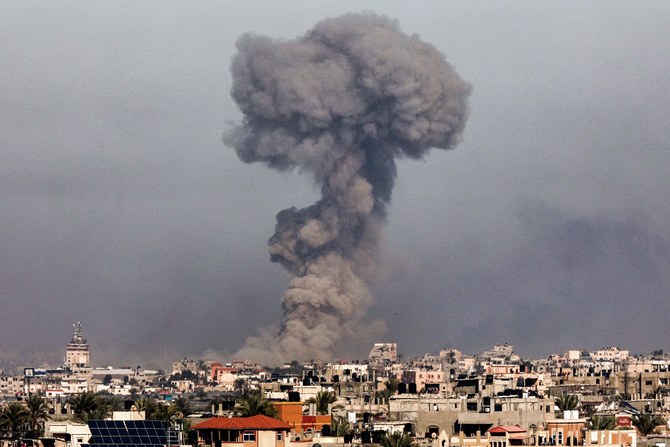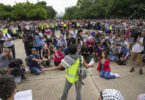Chris Doyle
The term ‘‘genocide’’ has been widely debated regarding the Israeli onslaught on Gaza. Those to have made this grave accusation have included prominent legal figures, genocide experts and UN officials. Few charges could be more serious.
The merits of the accusation will this week be tested at public hearings at the International Court of Justice, the principal judicial organ of the UN. South Africa initiated proceedings against Israel on Dec. 29. It argues that there is an obligation on all states in Article 1 of the 1948 Genocide Convention “to prevent and punish the crime of genocide.” South Africa is seeking to fulfill this obligation. How many other states will back its case? Turkiye and Jordan have officially supported South Africa, as has the Organization of Islamic Cooperation.
It is a damning 84-page application prepared by distinguished lawyers. Even if it turns out that it does not quite cross the court’s line for genocide, it is a savage indictment of Israeli actions in Gaza that should shame the world for its inaction. Israel, as is its wont, responded in fury, a spokesman referring to South Africa’s case as an “absurd blood libel.” The threshold for the charge of genocide is high. It is a much tougher charge to make stick than war crimes, which are dealt with by the International Criminal Court.
This is the initial stage. The court has responded rapidly because it has the power to order preliminary measures to stop or prevent a genocide taking place if it determines that this is “plausible.” This is a much lower threshold than will be adopted when the court makes its final determination on whether Israel has committed genocide – a process that typically takes about four years. In the case of Bosnia, the court took from 1993 to 2007, so it is understandable why it feels the need to make this initial finding. Are there precedents? The case Gambia brought against Myanmar is one. In 2022, the court accepted that Gambia had standing and ordered Myanmar to prevent the commission of genocidal acts against the Rohingya. That decision was revolutionary. It meant that a state party to a treaty that protects common legal rights can enforce those rights even if it is not directly affected by the violation. In March 2022, the International Court of Justice ordered Russia to halt its offensive in Ukraine – an order that was supposed to be legally binding. Moscow ignored it.
Both Israel and South Africa have ratified the Genocide Convention. There should not be any questions over jurisdiction, even though Tel Aviv may argue the point.
One Israeli argument may be that the Palestinians in Gaza do not qualify as a national, ethnic, racial or religious group for the purposes of the convention. It cannot argue justification, as there is no legal, let alone moral, argument for genocide. All these arguments would be a slippery way to bypass the genocide charge – hardly an endorsement of Israeli actions. Has South Africa presented a sound case? No application can be 100 percent watertight. The argument is that Israel is guilty by both intent and conduct. The issue of intent to commit genocide is typically a stumbling block. Those regimes that have done it in the past were rarely crazy enough to advertise their intent publicly. But South Africa argues that Israel has violated the Genocide Convention by failing to suppress “direct and public incitement to commit genocide.”
Israeli leaders, including the president, prime minister and defense minister, have been surprisingly bold in their genocidal statements, as I have covered before. Members of the Knesset routinely refer to the need for Gaza to be “wiped out,” “flattened,” “erased” and “crushed.” The court will not determine individual responsibility, but these figures were crucial in determining Israeli policy. As for Israel’s conduct, the South African charge sheet is detailed with 574 footnotes. The application notes not just what Israel has done to Gaza since Oct. 7, but also its previous policies, including the 16-year-old blockade of the Strip and the 56-year-old occupation that has left the Palestinian population extremely vulnerable. It presents a pattern of Israeli behavior geared toward rendering Gaza uninhabitable.
The submission also highlights how Israel has, since Oct.7, tried to deny the civilian population objects indispensable to their survival through a “total siege” and the targeting of key civilian infrastructure. It points to how Israel has destroyed in excess of 355,000 Palestinian homes. It cites the forced displacement of 85 percent of the population. The widespread Israeli attack on Gazan healthcare is another key element. What happens if the court determines that there are “plausible grounds” that a genocide is in progress. It can order preventive measures that are, in theory, binding. South Africa proposes nine very specific actions, including the cessation of all Israeli military actions in Gaza.
Those states that have been arming Israel or facilitating its arming will reject the charge that Tel Aviv is committing genocide, but will be shaken by any such finding. Leaders and officials could land up in legal difficulties on the grounds of complicity. This is why the US was quickly out of the blocks to condemn the document. A US spokesman described the charges as “meritless, counterproductive and completely without any basis in fact whatsoever.” Would states like the UK be content to continue to trade in arms with Israel?
This may just be the opening round in a long series of legal battles for Israel. The International Court of Justice may set the tone for others to follow. If it rejects the South African application, Israel will claim victory and act as the victim of a grand antisemitic conspiracy. If the court accepts the arguments, the International Criminal Court may feel under greater pressure to deliver its own verdicts on alleged war crimes perpetrated by both Israel and Hamas. Many will feel that the whole international justice system is in the dock. Given what Israel has done, can these judicial organs do what the major international powers have failed to do for so long and hold Israel to account? It may be a long journey.







